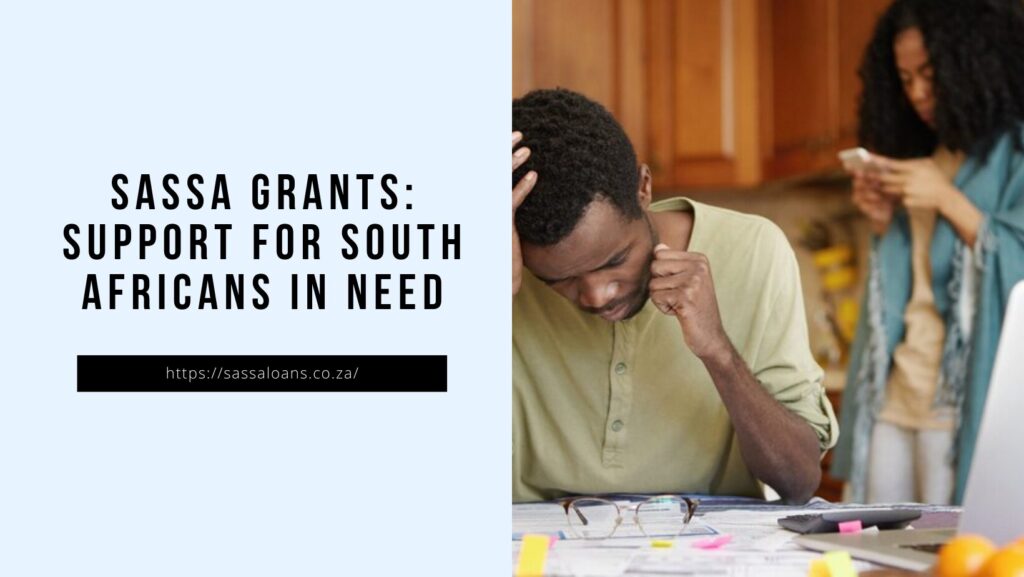How SASSA Grants are Fueling Social Progress in South Africa?
In the past decade, South Africa has seen monumental strides in tackling poverty and improving livelihoods through its social security program. At the forefront of these efforts stands the South African Social Security Agency, commonly known as SASSA. By disbursing various social grants to vulnerable communities, SASSA has emerged as a stalwart champion of welfare and inclusion. In this blog, we explore SASSA’s multifarious grants, analyze their socioeconomic influence, and celebrate the agency’s crusade for a just society.

SASSA Grants: A Force for Good
SASSA oversees a wide suite of a sassa status check, including the Child Support Grant, Foster Child Grant, Care Dependency Grant, Grant-in-Aid, and Disability Grant. However, its flagship initiative is the R350 Social Relief of Distress (SRD) Grant, also referred to as the Special COVID-19 Social Relief of Distress Grant. Introduced in May 2020 to cushion the blow of the pandemic, the SRD grant has since benefited over 10 million impoverished South Africans.
With a monthly payout of R350, the SRD grant may seem paltry. However, for vulnerable households living below the breadline, it is nothing short of a lifeline. Multiple studies have shown the SRD grant significantly boosts recipients’ food security and financial inclusion. In cities and rural villages alike, the ripples of this “small” relief are immense. From sustaining subsistence farmers to fueling local entrepreneurship, the SRD grant’s socioeconomic impact belies its monetary value.
SASSA grants are also making education more equitable. The Child Support Grant and Care Dependency Grant jointly cover over 12 million children, with funds largely spent on school fees, supplies, and childcare. This supportive framework is reducing dropout rates, improving educational outcomes, and positioning SA’s youth for successful careers and financial independence.
Overall, SASSA grants have lifted 3.5-4.5 million South Africans out of extreme poverty and lessened inequality since its inception. They have become a lifeline not just for poor households but local communities and the nation at large.
Illuminating the Data Behind Poverty Reduction
But what does the actual data show? Let’s deep dive into some of SASSA’s impact metrics:
- According to SASSA (2019), over 18 million recipients received R93 billion in grants in 2018/19. The biggest allocations went to Child Support Grant, Disability Grant, and Old Age Pension.
- Independent research reveals SASSA grants reduced SA’s Gini coefficient – a measure of income inequality – by 8-12% between 2006-2015. Some studies put the figure even higher.
- A 2021 report showed more than half of households in the bottom two quintiles depended primarily on grants.
- Small-scale studies found SASSA recipients spent over 60% of grant money on essentials like food, education, utilities. Less than 20% was spent on vices like alcohol.
- The 2020 lockdown saw a rise in extreme poverty. But SASSA grants pr
evented this increase from being even sharper, according to analysts. Around 1 million were lifted from hunger.
As one can see, SASSA grants have succeeded in not just alleviating destitution but also curbing inequality on a systemic level through targeted distribution. Moreover, recipients overwhelmingly use funds responsibly to meet basic needs – reinforcing grants’ dignity-preserving function in society.
Enabling Opportunity: Bursaries and Beyond
Of course, grants alone cannot dismantle generational poverty. That’s where SASSA’s complementary initiatives come in, leading beneficiaries toward self-sufficiency. A prime example is its bursary programs run in association with reputed partners like Standard Bank Bursary and industry bodies.
Some highlights of SASSA-enabled bursary schemes:
- Standard Bank Bursary: Annually awards tuition fees to 400 SASSA grant recipients pursuing tertiary qualifications in fields like education and healthcare.
- Energy SETA Bursary 2024: The 2024 bursary covers energy industry training for those in or linked to SASSA grants.
- National Skills Fund: Sponsors un/underemployed grant recipients for skills development programs with credible providers. Boosts employability.
By financing higher education, these demand-driven programs are plugging SA’s skills gap while empowering beneficiaries to stand on their own feet. Many graduates now occupy important jobs, paying taxes as active citizens instead of passive welfare recipients.
Increasing Financial Freedom
Another crucial facet is streamlining grant disbursements to enhance recipients’ financial freedom and independence. Traditionally, cash paypoints were the sole disbursement mode. However, SASSA recognized drawbacks like inclusion barriers; opportunity costs through waiting times, and safety concerns.
Therefore, the agency has digitized and diversified payment options over the decade:
- Bank accounts: Today, over 17 million recipients receive funds directly into individual accounts after correct advice on topics like SASSA change banking details for r350 online or other methods.
- Cash Send: For areas lacking banking infrastructure, Cash Send provides doorstep delivery of grants via accredited retailers like Shoprite.
- Debit cards: Signature-enabled cards pre-loaded with monthly allocations eliminate queues and transaction fees.
These innovations have undoubtedly strengthened financial inclusion while restoring recipients’ dignity and autonomy over how they access their grants. Mobile phone-based services further raise accessibility through South Africa’s burgeoning digital infrastructure.
A Ray of Hope
In sum, SASSA has admirably carried the torch of social justice over an extraordinarily tough yet transformative period for South Africa. Through compassion and innovation, the agency continues uplifting lives and knitting communities even in adversity. By directly empowering over 17 million people monthly, SASSA grants have evolved into not just a financial lifeline but a beacon of hope guiding the nation toward shared prosperity.
Although poverty cannot be eliminated overnight, SASSA shows us the small steps of solidarity that snowball into momentous progress when taken together. It is a shining example of how upholding human dignity strengthens society as a whole. As the agency builds on two decades of impact, we are blessed to walk alongside in its vision for a caring, equitable, and opportunity-filled South Africa for all. Bookmark SASSA & Loans today for all the latest updates and regular guidance for your smooth SASSA applications.